 |
Picks is a monthly sampling of Japan's art scene, offering commentary by a variety of reviewers about exhibitions at museums and galleries in recent weeks, with an emphasis on contemporary art by young artists. |
 |
 |
 |
3 February 2020 |
 |
| 1 | 2 | |
 |
|
 |
 |
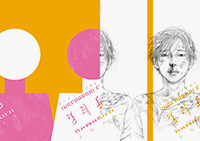 |
 |
inseparable: KAWARIMI |
| 29 November - 11 December 2019 |
Tokyo Metropolitan Theatre
(Tokyo) |
 |
| The inseparable project is a collaboration between novelist Sayaka Murata and playwright-director Shu Matsui, founder of the Sample theater troupe. KAWARIMI, for which Murata wrote the novel and Matsui the play, concerns themes shared by the two -- community, family, reproduction, sex, medical advances, ethics, and metamorphosis. The stage production is set on a fictitious island, a microcosm of Japan where mythology and a post-human future merge in a darkly absurdist take on contemporary Japanese society. |
|
|
 |
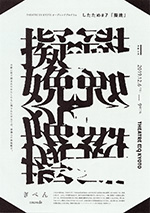 |
 |
| Shitatame #7: Couvade Syndrome |
| 6 - 9 December 2019 |
Theatre E9 Kyoto
(Kyoto) |
 |
| The titular syndrome, so named by cultural anthropologists, is defined as a ritual practiced in some countries in which a husband engages in behavior emulating the childbirth experience when his wife gives birth. Taking this custom as a dramatic premise, playwright Nagara Wada of the theater unit Shitatame asks, "How would my body and daily life be transformed if I were to become pregnant and give birth?" Through the physical gestures of the actors, the work simulates this imagined experience from a variety of perspectives, all on a highly personal, naturalistic level. |
|
|
|
|
|
|
|

|
 |
 |
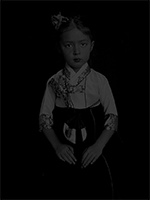 |
 |
| Oriental Discourse |
| 29 November - 9 December 2019 |
Komagome1-14 cas
(Tokyo) |
 |
| The three female artists and art units featured in this self-produced joint show share a cultural and ethnic identity as immigrants, primarily as part of the Korean diaspora. One question posed by all these works is "To what extent are our 'memories' fiction?" The artists are Asian-French Yoshimi Lee, German-Korean-Jewish Alisa Berger, and the art unit consisting of Japan-born Korean Yumi Song and Israel-born Yisha Garbarz. |
|
|
 |
 |
| Festival/Tokyo 19 |
| 5 October - 10 November 2019 |
Tokyo Metropolitan Theatre, other venues
(Tokyo) |
 |
| An annual event in the Toshima/Ikebukuro district of Tokyo, this year's festival offered a menu of plays challenging the notion of national boundaries, with a special program, "Transfield from Asia," featuring lectures and performances by participants from Japan, Malaysia, Ethiopia and Myanmar. Citing the controversy that embroiled Aichi Triennale 2019, panelists at a symposium spoke of the need for a strategy to combat the censorship occurring in many Asian countries. There was much wisdom to be gained from the accounts of such struggles by artists throughout the region, even in places as unexpected as Singapore. |
|

|
 |
 |
 |
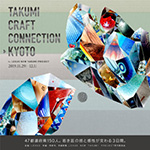 |
 |
| Takumi Craft Connection - Kyoto |
| 29 November - 1 December 2019 |
Kyoto Shimbun Bldg., Heian Shrine, Kenninji
(Kyoto) |
 |
| Takumi (artisans) are hot these days, and this event gave the impression that they are at the center of a growing movement. Sponsored by the Lexus New Takumi Project, which supports young artisans (traditional and contemporary) and designers throughout Japan, the show was divided into three sections. Kyoto Connection featured an installation by Kyoto artisans at Kenninji temple; Japan Connection displayed works by 150 participants from around the country in the Kyoto Shimbun Building; and Creators Connection offered six exhibits by leading-edge fashion, product, and architectural designers at Heian Shrine. |
|
|
 |
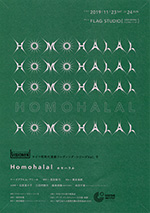 |
 |
| Visionen Vol. 9: Homohalal |
| 23 - 24 November 2019 |
Flag Studio
(Osaka) |
 |
| The latest in a series of readings of German-language plays addressing current social problems. Homohalal, by Vienna-based Syrian-Kurdish playwright Ibrahim Amir, takes place in Austria in 2037, 20 years after the country was rocked by clashes over the admission of immigrants. In introducing a work that critiques attitudes toward the acceptance and assimilation of refugees in Europe, including its theater culture, the Japanese production devised strategies for making audiences here engage with these concerns as well. |
|
|
|
|
|
|
|
|
|
 |

 |
|
|
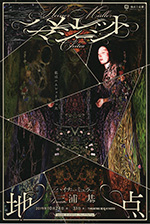 |
 |
| Chiten: Hamletmachine |
| 24 - 31 October 2019 |
Theater E9 Kyoto
(Kyoto) |
 |
| Loosely based on Shakespeare's Hamlet, German playwright Heiner Muller's Hamletmachine deconstructs and reconstructs the story, interspersing numerous quotations from diverse texts. The Kyoto-based Chiten theater company's production further cut up Muller's script and recombined it with related texts from such sources as Brecht, Elfriede, the Greek tragedy Electra, and Muller's own speech Shakespeare a Difference. |
|
|
 |
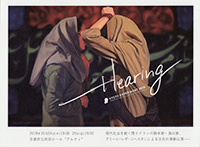 |
 |
| Amir Reza Koohestani / Mehr Theater Group: Hearing |
| 24 - 25 October 2019 |
Art Live Theater International
(Kyoto) |
 |
| Staged at the international performing arts festival Kyoto Experiment 2019, Iranian playwright Koohestani's meticulously structured drama takes place in a university women's dormitory strictly off-limits to men. The play begins when a girl complains that she heard a man's voice in one of the rooms; it goes on to address such topics as monitored societies, the psychology of false accusations and rumors, traumatic memories, misogyny, and the desire to converse with the dead. The production successfully recreated the experience of isolation and oppression in Iran in the here and now of a Japanese theater. |
|
|

|
 |
|
 |
| 1 | 2 | |
 |
|
 |
|